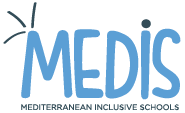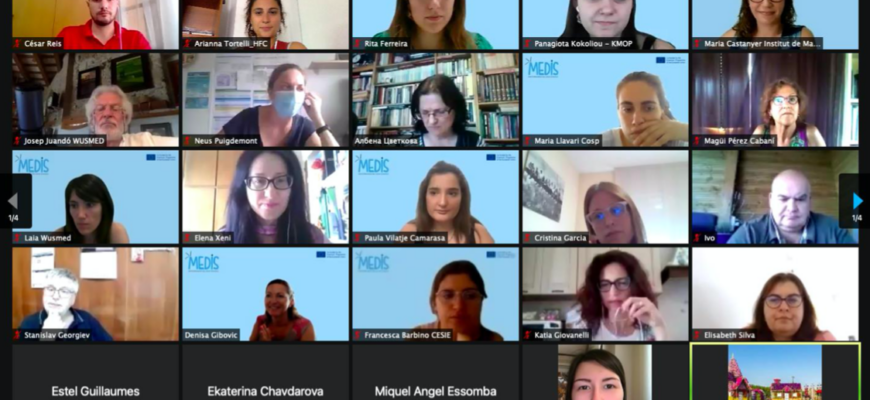
The final conference was held online on the 6th July 2021 from 10.00am to 13.00pm CET. The Agenda (ANNEX I) included a plenary session which was followed by the national breakout rooms and ended with final remarks and conclusions.
The session opened with a welcoming note by Mrs. Denisa Gibovic from the coordinating organization WUSMED, who thanked everyone for their participation at the MEDIS final conference and for their valuable contribution. Also, Mrs. Gibovic presented the agenda of the day and gave a brief introduction about the project and presented the consortium that has been working the last three years on the implementation of the MEDIS project.
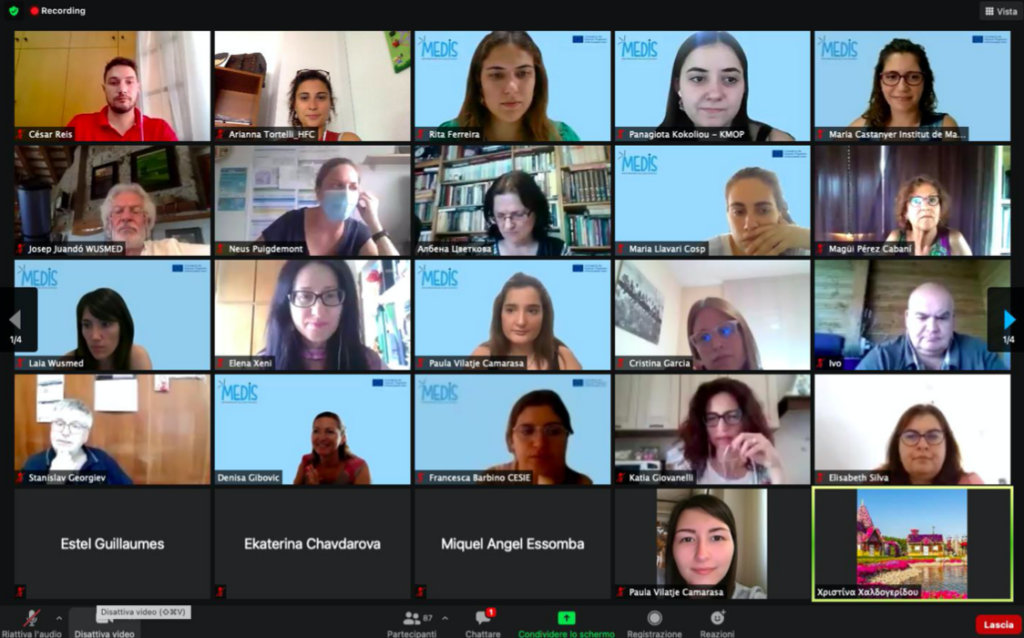
The session continued with Mrs. Ester Rafel on behalf of the Department of Education of the Generalitat de Catalunya and Mr. Josep Juandò from WUSMED who highlighted the importance illustrating the results of MEDIS project and the necessity to disseminate the good practices not just within the consortium, but also to the wider public. Lastly, they extended their thanks and congratulated all the participants and the partners for their work.
The keynote speech was held by Dr. Miquel Àngel Essomba i Gelabert, General Manager of the Diversity and Inclusion in Complex Societies Research Team & Associate Professor of the Department of Applied Pedagogy of the Autonomous University of Barcelona. In his speech, the professor focused on the concepts of social inclusion and of diversity, from different backgrounds and perspectives. He stressed the importance of the project for the social inclusion of children in migrant background in the host country.
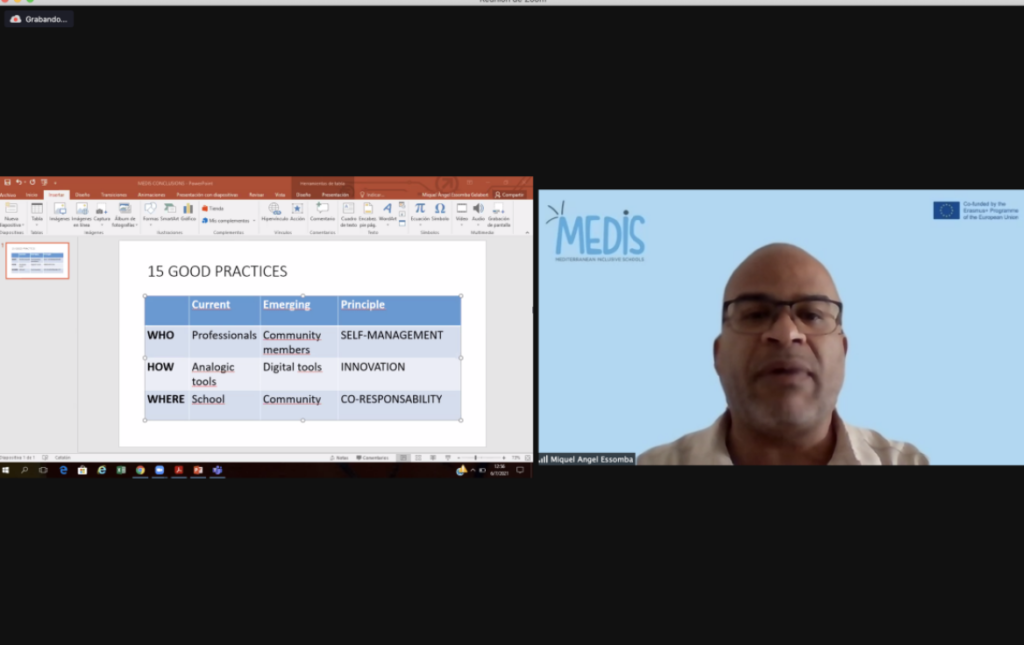
He further explained how diversity, regardless is often perceived as something negative and to delete, is actually an opportunity. In order to include diversity in society, Dr. Essomba i Gelabert suggest a 3-steps process:
- A matter of perceptions. Personal perceptions need to be transformed, following a two-way process of deconstruction and reconstruction of one’s mentality, by integrating in ourselves the issue of diversity and realizing the inter-group differences and the inter-group similarities
- A matter of prepositions. “You against me” needs to be transformed in “you and me against our problem”: in this way, a sense of inclusion is created. Empathy and confidence about otherness are needed.
- A matter of frame. The place where we live needs to be reframed, by shifting from neighborhoods to communities, from private to public spaces. Union is the key to social inclusion.
In the final part of his intervention, the professor showed the video “All that we share” from TV2 Denmark, which underlines the importance of focusing on similarities between people rather than on differences, in order to promote social inclusion.
At the next part of the agenda, the participants joined 6 breakout rooms according to their country of origin (Italy, Greece, Cyprus, Spain, Bulgaria and Portugal) and their mother tongue in order to discuss the project’s outcomes at national level.
At the breakout rooms, each partner organization presented the good practices implemented during the pilot phase and the policy recommendations that resulted through the interviews with key-stakeholders from the education and migration fields. Aiming to increase the dissemination at wider level and raise awareness on educational and social inclusion of children with migrant background, the consortium will extend the promotion of the policy recommendations to different networks and interested parties, both governmental and non-profit. Also, the participants had the chance to interact directly between them and with the presenters, to exchange ideas, to provide suggestions, to gain knowledge about the impact of the project and to discuss further steps on how to tackle social and educational marginalization.
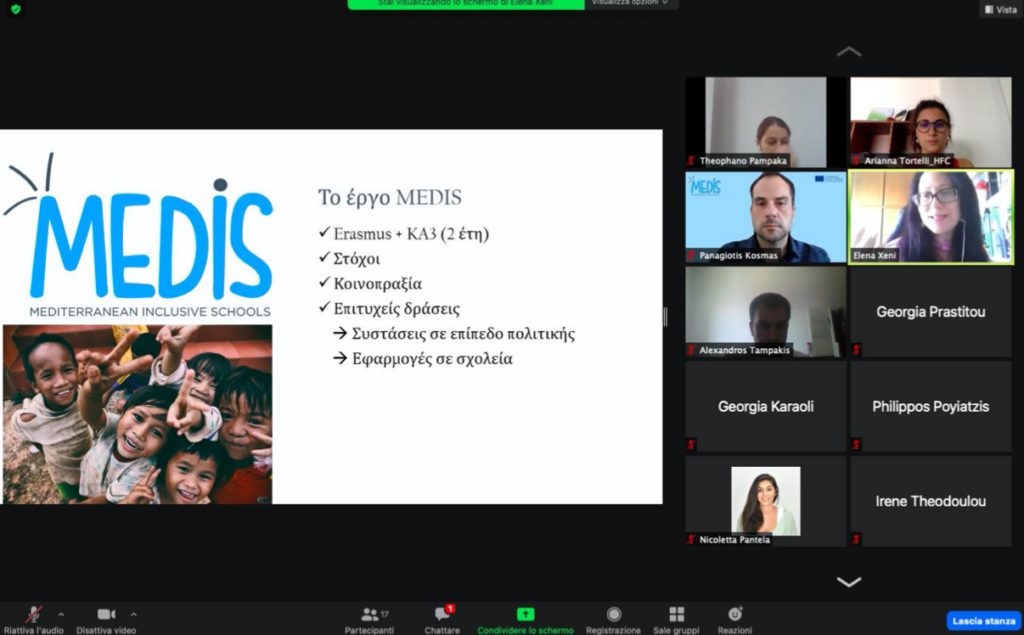
At the end of the breakout rooms’ sessions, the participants returned to the plenary where they entered into interaction and discussed the outcomes and conclusions resulted from the breakout rooms. Overall, the consortium agreed that there is a necessity to work both at individual and collective level to enhance the process of socialization and inclusion at local level, involving new schools and educational entities to widen the network of MEDIS inclusive schools. This process requires well-trained professionals, the development of inclusive educational programs and the adoption of multicultural methodologies and approaches in schools. It was stressed the importance of the MEDIS online platform where learning tools, MOOC courses and the Handbook for Mediterranean School Program are available, in order to amplify the impact of the project at local and international level and share knowledge to a wider public.
Concluding, the coordinators of the project thanked everyone for their interest in the MEDIS project and for the active participation at the discussions. Each partner organization took the floor and expressed their thanks to the consortium for their collaboration as well as for the successful implementation of the MEDIS project. The results were fruitful and productive, even if Covid-19 has been a challenge, the partners were determined to reach the goals and provide the best outcomes. Additionally, it was underlined the importance of MEDIS for changing the lives of children with migrant background by facilitating their integration in the education setting of the host country as well as in society. It is remarkable that teachers and educators are willing and interested in implementing good practices that will allow the inclusion of all children in education.
Finally, at the end of the event an evaluation questionnaire has been sent to the participants.
